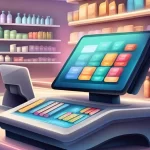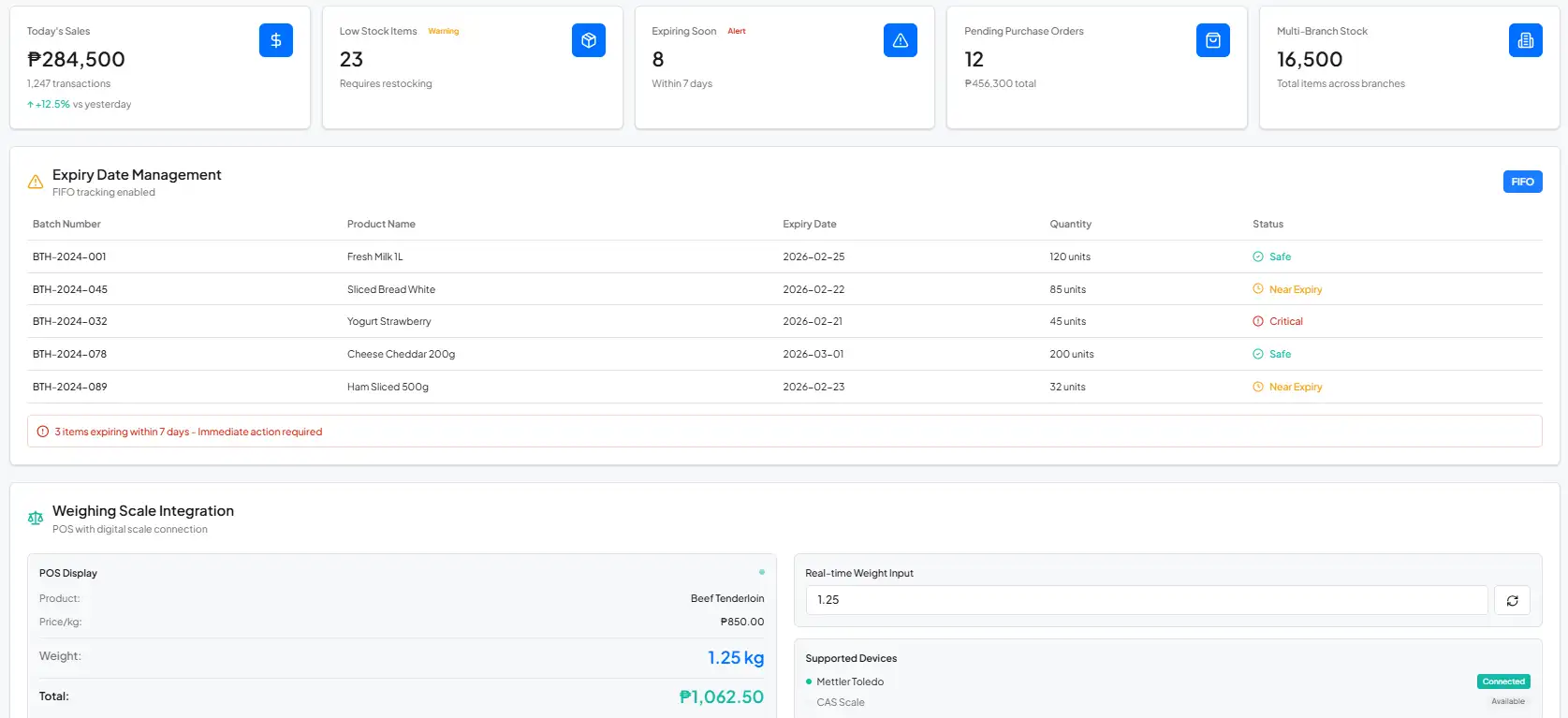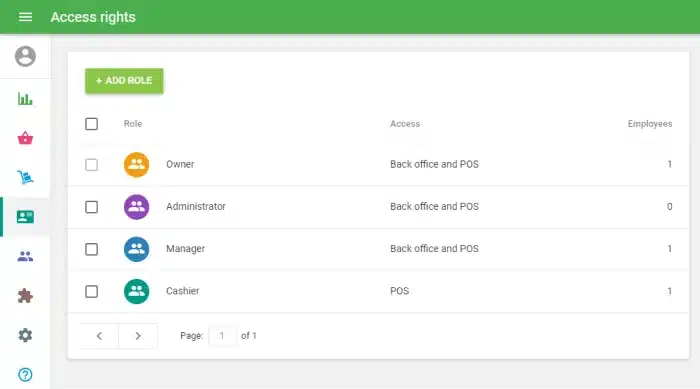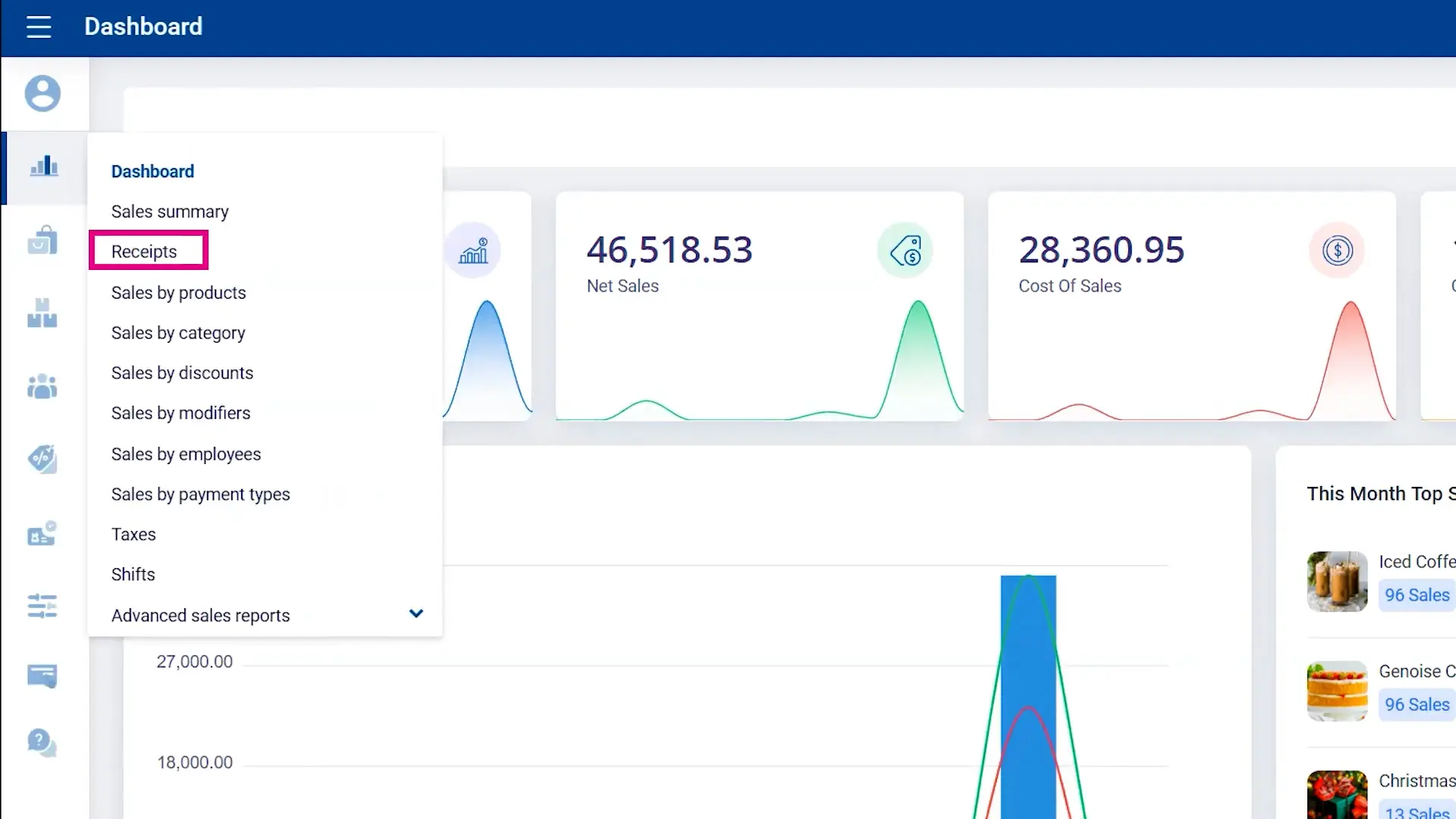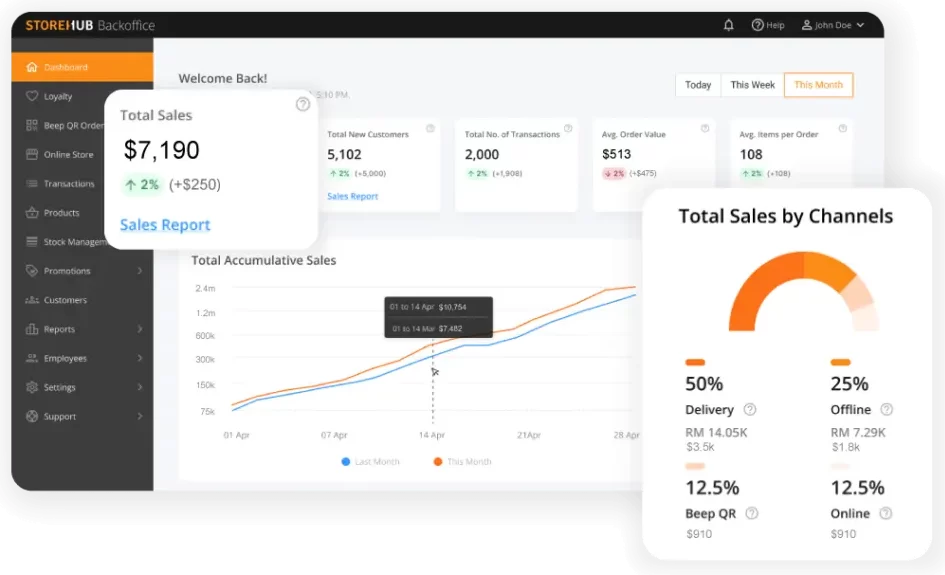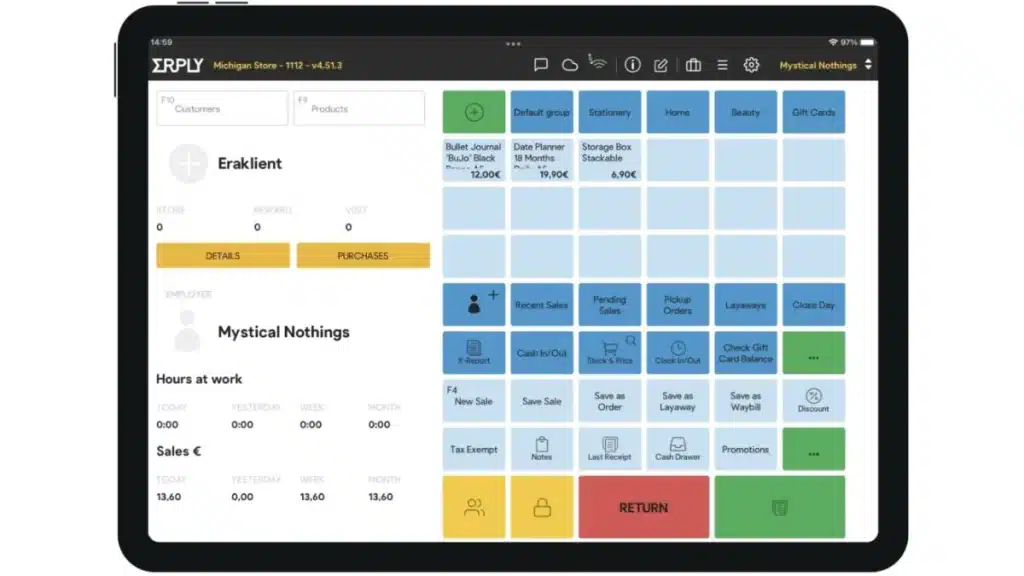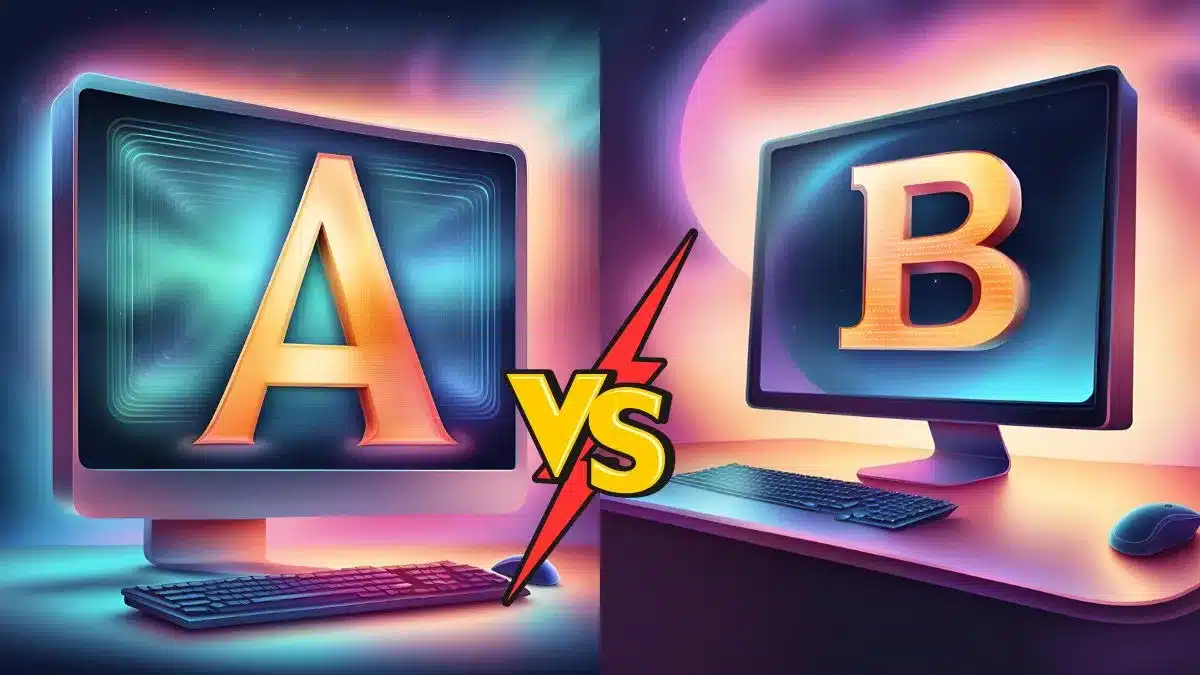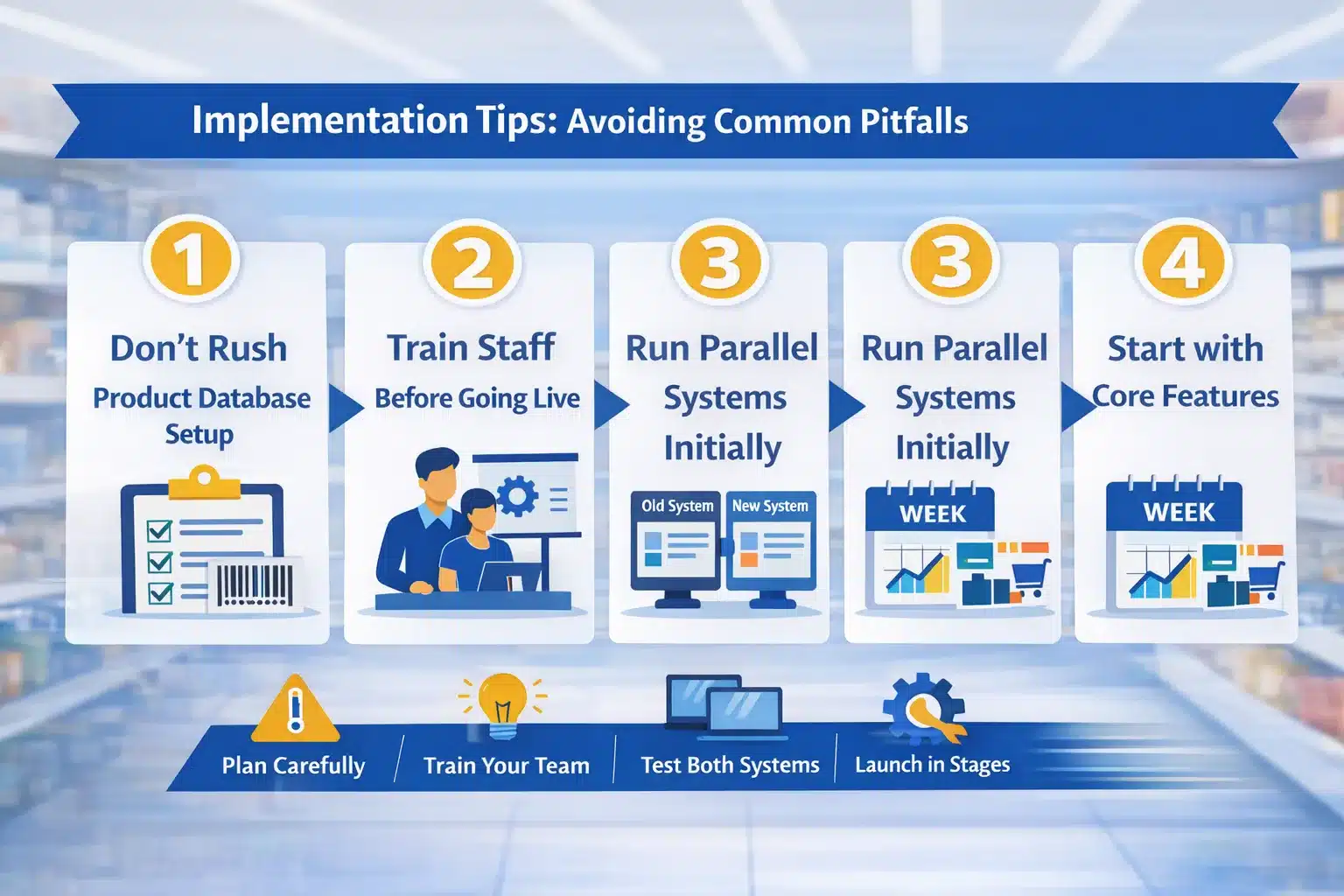Philippine retail sales are projected to reach around ₱6.5 trillion in 2025, driven by food and modern grocery formats. With intensifying competition, a reliable grocery store POS system is essential for efficient supermarket operations.
However, many stores still rely on outdated tools that make it difficult to manage perishable items, monitor inventory in real time, and coordinate across branches. Manual processes often lead to inefficiencies and data inconsistencies.
As a result, supermarkets in the Philippines are estimated to lose 8–12% of potential revenue annually due to spoilage and manual errors. Specialized supermarket software helps address these issues through perishable tracking and real-time stock visibility.
Table of Contents
Key Takeaways
|
Why Generic POS Systems Fall Short for Supermarkets
A regular point-of-sale system might work for a clothing boutique or a coffee shop, but supermarkets operate differently. Here’s why grocery businesses need specialized software:
1. Perishable Inventory is a Daily Battle
Unlike shoes or electronics, groceries have expiration dates. A supermarket handling 5,000+ SKUs needs software that can:
- Track expiry dates at the batch level
- Alert staff before products expire
- Automate FIFO (First In, First Out) inventory rotation
- Calculate potential losses from near-expiry items
2. Weight-Based Products Require Special Handling
Meat, fish, fruits, and vegetables are sold by weight, not by unit. Your retail operations management platform must integrate with weighing scales, print price labels on the spot, and update inventory based on actual weight sold.
3. High Transaction Volume Demands Speed
A typical supermarket processes 200-500 transactions per day, with each transaction containing 10-30 items. Checkout speed directly impacts customer satisfaction and queue length.
4. Supplier and Procurement Complexity
Supermarkets work with dozens of suppliers, from local farmers to national distributors. Managing purchase orders, delivery schedules, and payment terms requires dedicated procurement features.
5. Multi-Branch Operations
Many Philippine supermarket owners operate 2-5 branches. Centralized inventory visibility, stock transfers between locations, and consolidated reporting are essential.
Essential Features Checklist for Philippine Supermarkets
Before you start comparing vendors, here are the features your shortlist should cover:
| Feature | What to Look For | Why It Matters |
| Inventory Management | Batch tracking, expiry alerts, FIFO automation | Reduces spoilage losses by up to 30% |
| POS Capabilities | Fast checkout, barcode scanning, weighing scale integration | Improves customer throughput during peak hours |
| Pricing Flexibility | Multi-tier pricing, bundle discounts, senior/PWD discounts | Supports compliance with Philippine pricing regulations |
| Supplier Management | Purchase orders, supplier performance tracking | Simplifies reordering and keeps stock levels steady |
| Reporting & Analytics | Real-time sales, inventory valuation, and shrinkage reports | Helps you spot trends and act on them quicker |
| BIR Compliance | Official receipts, sales reports, CAS accreditation | Avoids compliance risks and legal penalties |
| Multi-Branch Support | Centralized dashboard, inter-branch stock transfers | A must-have once you run more than one location |
| Offline Mode | Continues operation during internet outages | Critical for areas with unstable connectivity |

Top-Rated Supermarket Software in the Philippines
The right software makes a noticeable difference in how your store runs, from keeping shelves stocked to moving checkout lines faster. Here are five options worth evaluating.
1. HashMicro Supermarket Software
Best For: Medium to large supermarkets and grocery chains with 2+ branches
HashMicro is a full ERP-based supermarket solution available in the Philippine market. Unlike standalone POS systems, HashMicro integrates point-of-sale with inventory, accounting, procurement, and HR, all in one platform.
What Makes HashMicro Different for Supermarkets:
For grocery businesses specifically, HashMicro offers batch and lot tracking that monitors expiry dates down to the individual shipment level. When you receive 100 cartons of milk from different production dates, the system tracks each batch separately.
The software also handles the complexity of weight-based selling. Connect your weighing scales directly to the POS, and the system automatically calculates prices, prints labels, and deducts from inventory based on actual weight, not estimated units.
Key Features for Supermarkets:
- Expiry Date Management: Automatic alerts and FIFO enforcement
- Weighing Scale Integration: Direct connection with Mettler Toledo, CAS, and other brands
- Multi-Branch Control: Real-time inventory visibility and stock transfers
- Supplier Portal: Vendors can view purchase orders and update delivery status
- BIR-Ready Reporting: Pre-configured reports for CAS compliance
Pricing: Custom quote based on modules and branches. Free consultation available.
Considerations:
- Higher upfront investment compared to cloud-only solutions
- Best suited for businesses ready to commit to full digitization
- Implementation takes 4-8 weeks for full deployment
2. Loyverse
Best For: Small supermarkets, local retail stores, single-location groceries
Loyverse has become popular among Philippine small business owners for one compelling reason: the core POS features are completely free. For a mini-mart owner testing the waters of digital inventory management, this zero-cost entry point is attractive.
What Makes Loyverse Work for Small Groceries:
The free tier includes basic inventory tracking, sales reporting, and customer loyalty programs. For a store managing 500-1,000 SKUs. The mobile-first design means you can run your entire operation from a tablet or smartphone.
However, Loyverse has limitations for serious supermarket operations. Expiry date tracking requires manual workarounds, weight-based selling needs additional configuration, and multi-branch features require paid add-ons.
Key Features:
- Free Core POS: No monthly fees for basic features
- Mobile-Friendly: Works on Android and iOS tablets
- Loyalty Program: Built-in points system to retain customers
- Basic Inventory: Stock tracking and low-stock alerts
- Cloud-Based: Access reports from anywhere
Pricing: Core POS: Free | Employee Management: $5/mo | Advanced Inventory: $25/mo | Integrations: $9/mo
Considerations:
- Limited scalability for growing businesses
- No native expiry date tracking
- Basic reporting compared to enterprise solutions
- Support is primarily online/community-based
3. SalesPlay
Best For: Supermarkets in areas with unreliable internet, businesses prioritizing offline capability
SalesPlay addresses one of the biggest pain points for Philippine retailers outside Metro Manila: unstable internet connectivity. The system is designed to work offline-first, syncing data automatically when a connection is restored.
Why Offline Capability Matters:
Imagine your internet goes down during peak hours. With most cloud-based systems, you’re stuck; transactions can’t be processed, and inventory won’t update. SalesPlay continues operating normally, storing all data locally.
Key Features:
- True Offline Mode: Full functionality without internet
- Automatic Sync: Data uploads on its own once connectivity returns
- Inventory Management: Stock tracking with low-stock alerts
- Employee Management: Clock-in/out and sales performance tracking
- Multi-Device Support: Use on tablets, phones, or desktops
Pricing: Starter: Free (limited) | Pro: $29/mo | Enterprise: Custom
Considerations:
- Less robust inventory features than ERP-based solutions
- Limited integration with Philippine payment systems
- Expiry tracking is not as sophisticated as supermarket-specific software
4. StoreHub
Best For: Growing supermarkets wanting SE Asian-focused support
StoreHub is a regional player with a strong presence in Malaysia, Singapore, and the Philippines. Unlike American solutions, StoreHub understands the Southeast Asian retail landscape, including BIR-compliant POS compliance.
What Sets StoreHub Apart:
The platform offers a complete ecosystem: POS hardware, inventory management, e-commerce integration, and delivery platform connections. For supermarkets exploring online ordering, StoreHub provides ready-made integrations with GrabMart.
Key Features:
- Regional Focus: Designed for SE Asian markets
- Hardware + Software Bundle: All-in-one packages
- E-commerce Ready: Sync physical store with online shop
- Delivery Integration: Grab, foodpanda, local couriers
- QR Ordering: Scan and order for pickup
- Multi-Location Dashboard: Manage branches from one screen
Pricing: Starter: P1,874/mo | Professional: P3,749/mo | Enterprise: P7,499/mo
Considerations:
- Monthly fees add up over time
- Some features require higher-tier plans
- Less customizable than ERP alternatives
5. Nextar
Best For: Budget-conscious supermarkets wanting a Windows-based solution with a one-time payment
Nextar takes a different approach from the subscription model: you pay once and own the software. For supermarket owners wary of ongoing monthly fees, this traditional licensing model has appeal.
The One-Time Payment Advantage:
While most modern retail payment processing systems charge ₱1,500-₱7,500 per month, Nextar’s perpetual license means you pay upfront and avoid recurring costs. Over 2-3 years, this can result in significant savings.
Key Features:
- Perpetual License: One-time payment, no monthly fees
- Windows-Based: Runs on standard PCs
- Inventory Management: Stock tracking with reorder points
- Barcode Support: Print and scan product barcodes
- Basic Reporting: Sales and inventory reports
- Multi-User: Support for multiple cashier stations
Pricing: One-time fee ~ $99-$299
Considerations:
- Interface feels dated compared to modern cloud solutions
- Limited cloud features and mobile access
- Updates may require additional payment
- Support quality varies
How to Choose the Right Supermarket Software: A Decision Framework
Selecting supermarket software isn’t just about features; it’s about finding the right fit for your specific situation. Here’s a framework to guide your decision:
Step 1: Assess Your Current Pain Points
Before comparing software, identify what’s actually hurting your business:
- Are you losing money to expired products?
- Is checkout speed causing customer complaints?
- Do you struggle to track inventory across branches?
- Is manual bookkeeping consuming too much time?
Prioritize software that directly addresses your biggest pain points.
Step 2: Calculate Your True Budget
Consider the total cost of ownership over 3 years:
| Cost Component | One-Time System (e.g. Nextar) | Subscription-Based Systems |
| Software License | ₱5,000 – ₱15,000 (one-time) | ₱0 |
| Monthly Fees | ₱0 | ₱1,500 – ₱7,500 /month |
| Hardware | ₱15,000 – ₱50,000 | ₱15,000 – ₱50,000 |
| Implementation | ₱5,000 – ₱20,000 | Often included |
| Training | ₱5,000 – ₱15,000 | Often included |
| Estimated 3-Year Total Cost | ₱30,000 – ₱100,000 | ₱70,000 – ₱320,000 |
Step 3: Evaluate Scalability
Ask yourself: Where will your business be in 3-5 years?
- Opening new branches? → Need multi-location support
- Adding online sales? → Need an online inventory management solution
- Expanding product range? → Need robust inventory management
Pick software that can grow with you, switching later is expensive and disruptive.
Step 4: Check Local Support Availability
International software might have great features but poor local support. Verify:
- Is there a Philippine office or partner?
- What are the support hours? (24/7 or business hours only?)
- Is support in English/Tagalog?
- How quickly do they respond to issues?
Step 5: Request a Demo with YOUR Data
Don’t just watch a generic demo. Ask vendors to demonstrate:
- How they handle YOUR specific products (especially perishables)
- Reports YOU actually need for decision-making
- Integration with YOUR existing hardware (scales, printers)
Implementation Tips: Avoiding Common Pitfalls
Picking the right software is half the job, the other half is getting it running properly. Here’s what PH retailers learned the hard way:
1. Don’t Rush the Product Database Setup
Your product database is the foundation of everything. Take time to:
- Standardize product naming conventions
- Set accurate reorder points for each item
- Input correct unit measurements (piece, kg, pack, etc.)
- Add all relevant barcodes
Tip: Assign one dedicated staff member to manage the product database.
2. Train Staff Before Going Live
The most sophisticated software is useless if cashiers don’t know how to use it. Budget time for:
- Hands-on training for all cashiers
- Manager training on reports and inventory features
- Documentation of common procedures
- Practice runs during slow hours
If you’re managing employee schedules and training alongside the rollout, setting up a retail operations workflow management from scratch can give you a clearer structure for the transition.
3. Run Parallel Systems Initially
Don’t switch off your old system immediately. Run both systems for 1-2 weeks to:
- Catch data entry errors
- Verify inventory accuracy
- Let staff build confidence
- Identify workflow issues
4. Start with Core Features
It’s tempting to activate every feature immediately. Instead:
- Week 1-2: Focus on basic POS and sales
- Week 3-4: Add inventory management
- Month 2: Introduce reporting and analytics
- Month 3+: Advanced features (promotions, loyalty, etc.)
Conclusion
The importance of choosing the right supermarket software cannot be overstated. A dedicated grocery store POS system helps manage perishable inventory, handle weight-based products, and process high transaction volumes efficiently.
A modern solution goes beyond checkout processing. It integrates inventory control, supplier management, multi-branch visibility and compliance tools into one connected system, giving supermarket owners better control over stock movement.
Investing in the right platform is a strategic move for long-term growth. If you’re ready to minimize spoilage, streamline operations, and scale with confidence, consider scheduling a free consultation to explore the best solution for your supermarket.
FAQ
-
What is the top POS system for grocery stores?
The best POS for grocery stores handles batch-level inventory, weight-based pricing, and BIR-compliant receipts, features covered by several of the options listed above.
-
What is a POS system in a grocery store?
A grocery store POS system manages sales transactions, tracks inventory, and stores customer data, keeping daily tasks organized from a single screen.
-
How to use a POS in a supermarket?
To use a POS in a supermarket, staff input sales data, process payments, manage inventory, and generate reports for efficient store management.





